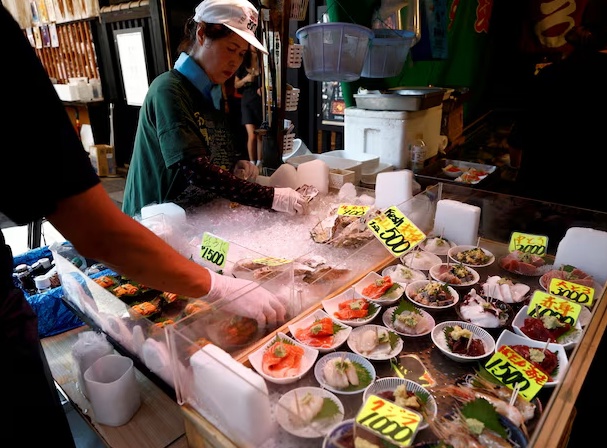China will “gradually lift” a ban on Japanese seafood imports, Japan’s Foreign Ministry said on Friday, a year after a ban imposed by Beijing in response to the release of treated wastewater from the Fukushima nuclear power plant, Chinese media reported.
Japan began dumping treated water from the Fukushima plant into the Pacific Ocean in August 2023, insisting it was safe, a view backed by the UN atomic agency. But the dumping drew a furious reaction from China, which called it “selfish” and banned imports of all Japanese seafood.
On Friday, Beijing and Tokyo said they had reached a consensus on the wastewater release, allowing China to gradually take it back. Beijing’s foreign ministry said in a statement:
China will begin to adjust the relevant measures based on scientific evidence and gradually resume imports of Japanese aquatic products that meet the regulation requirements and standards.
The ministry said officials from both sides have recently held “numerous rounds of consultations” over the discharges from the Fukushima nuclear power plant.
The statement said Japan pledged to “fulfil its obligations under international law, do its utmost to avoid adverse impacts on human health and the environment, and conduct continuous assessment of impacts on the marine environment and marine ecosystems.”
Around the same time as the announcement, Japanese Prime Minister Fumio Kishida said that Tokyo had informed Beijing of its “readiness to conduct additional monitoring of… treated water, and the Chinese side has decided to consistently restore imports of Japanese fishery products that meet certain standards.”
The IAEA said in a statement that it would “coordinate with Japan and other stakeholders, including China, to ensure that the additional measures are properly implemented… so that water discharge levels strictly meet and continue to meet international safety standards.”
In 2011, three reactors at the Fukushima Daiichi nuclear power plant in northeastern Japan failed after a massive earthquake and tsunami killed about 18,000 people. Since then, nuclear plant operator TEPCO has been collecting water contaminated from cooling the destroyed reactors, as well as groundwater and rain that seeped in.
After China banned imports of Japanese seafood in October due to the sewage release, Russia did the same as a “precautionary measure.”
